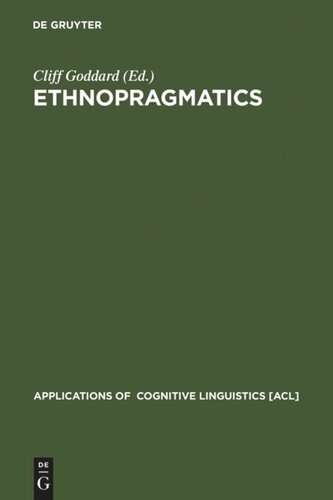

Most ebook files are in PDF format, so you can easily read them using various software such as Foxit Reader or directly on the Google Chrome browser.
Some ebook files are released by publishers in other formats such as .awz, .mobi, .epub, .fb2, etc. You may need to install specific software to read these formats on mobile/PC, such as Calibre.
Please read the tutorial at this link: https://ebookbell.com/faq
We offer FREE conversion to the popular formats you request; however, this may take some time. Therefore, right after payment, please email us, and we will try to provide the service as quickly as possible.
For some exceptional file formats or broken links (if any), please refrain from opening any disputes. Instead, email us first, and we will try to assist within a maximum of 6 hours.
EbookBell Team

5.0
70 reviewsThe studies in this volume show how speech practices can be understood from a culture-internal perspective, in terms of values, norms and beliefs of the speech communities concerned. Focusing on examples from many different cultural locations, the contributing authors ask not only: 'What is distinctive about these particular ways of speaking?', but also: 'Why - from their own point of view - do the people concerned speak in these particular ways? What sense does it make to them?'.
The ethnopragmatic approach stands in opposition to the culture-external universalist pragmatics represented by neo-Gricean pragmatics and politeness theory. Using "cultural scripts" and semantic explications - techniques developed over 20 years work in cross-cultural semantics by Anna Wierzbicka and colleagues - the authors examine a wide range of phenomena, including: speech acts, terms of address, phraseological patterns, jocular irony, facial expressions, interactional routines, discourse particles, expressive derivation, and emotionality. The authors and languages are: Anna Wierzbicka (English), Cliff Goddard (Australian English), Jock Wong (Singapore English), Zhengdao Ye (Chinese), Catherine Travis (Colombian Spanish), Rie Hasada (Japanese) and Felix Ameka (Ewe). Taken together, these studies demonstrate both the profound "cultural shaping" of speech practices, and the power and subtlety of new methods and techniques of a semantically grounded ethnopragmatics.
The book will appeal not only to linguists and anthropologists, but to all scholars and students with an interest in language, communication and culture.